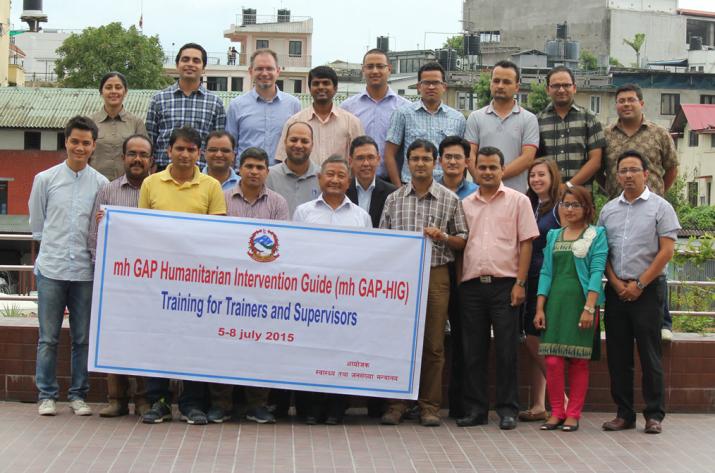
Brandon Kohrt (back row, third from left), poses with participants in the mhGAP-HIG training for trainers and supervisors this past summer
Published October 13, 2015, last updated on June 3, 2020 under Research News
Nepal’s earthquakes earlier this year caused unfathomable physical destruction. But as Brandon Kohrt—professor of psychiatry, global health and cultural anthropology—knows all too well, this type of crisis also takes a devastating toll on the mental health of the people in the affected communities, especially in a country like Nepal, where psychosocial services are few and far between.
Having designed interventions to treat post-traumatic stress disorder and other mental health issues among child soldiers and other vulnerable groups in Nepal over the past 20 years, Kohrt was well-positioned to assist in the earthquake response.
On October 21 at 12pm at DGHI, Kohrt and several of his Nepali colleagues will discuss their work with WHO and other organizations in addressing the mental health needs of earthquake survivors.
Engaging Duke Students in Response Efforts
In the weeks after the earthquakes, Kohrt co-led more than 100 contributors in the development of a desk review for the Inter-Agency Standing Committee Reference Group on Mental Health and Psychosocial Support in Emergency Settings. This document, which includes information from nearly 250 program reports and peer-reviewed research articles, was created to help relief organizations understand Nepal’s cultural context to inform their psychosocial response services.
Kohrt recognized early on that this crisis presented a unique opportunity to help global health students understand how to effectively respond to a humanitarian emergency. He worked with a number of Duke students on the desk review, for example, and he’s currently mentoring Hillary Richards, a Master of Science in Global Health candidate, in her Nepal-based thesis research on post-disaster implementation of mental health services.
Building In-Country Capacity among Primary Care Providers
In July, Kohrt turned his focus to building Nepal’s internal capacity to address mental health problems resulting from the earthquakes. He collaborated with the World Health Organization (WHO), the Government of Nepal Ministry of Health and Population and Nepal’s Transcultural Psychosocial Organization (TPO Nepal), to train 14 Nepali psychiatrists on the WHO’s mental health Gap Action Programme – Humanitarian Intervention Guide (mhGAP-HIG) model. These psychiatrists, in turn, will train and supervise doctors and health care assistants working in earthquake-affected districts to integrate mental health care into primary health care.
Throughout the next year, Kohrt will work with TPO Nepal to evaluate the mhGAP-HIG model in Nepal. This research expands the scope of a multi-year grant from the National Institute of Mental Health, through which Kohrt has been studying the effectiveness of similar training models in other regions of Nepal.
“The earthquakes and subsequent humanitarian crisis in Nepal provide an opportunity to put DGHI’s mission of service, research and education in action,” said Kohrt. “Through DGHI’s partner TPO Nepal, we’re providing trainings and services that will reach thousands of people. By combining this with rigorous research, we are rapidly adapting these services to best meet the public’s needs. And throughout this process, students are getting first-hand experience of the challenges and successes of emergency mental health programs.”
Next Week’s Event: Healing after Disaster
The lecture by Kohrt and his colleagues on Wednesday, October 21 at 12pm at DGHI, co-sponsored by DGHI’s Global Mental Health Group, is the first in a two-part series on Duke's global health work in Nepal following the earthquakes.
Kohrt will be joined by Suraj Koirala, the executive manager of TPO Nepal, and Nagendra Prasad Luitel, head of research at TPO Nepal. Koirala has worked extensively in mental health promotion in conflict-affected communities with population including child soldiers, refugees and internally displaced people. Luitel has co-led a number of large mental health research programs and has published more than 15 articles on mental health in peer-reviewed journals.
TPO Nepal is a leading psychosocial/mental health NGO in Nepal that works in research, intervention, training and advocacy.
Healing after Disaster, Part Two
In the second event in the series, on Wednesday, October 27 at 12pm, DGHI affiliate professor Mike Landry, Chief of Duke’s Doctor of Physical Therapy Division, will discuss his experiences as an injury and rehabilitation policy consultant to the WHO’s Nepal Office, where he is developing strategies to address the emerging needs of people injured by the earthquakes. He’ll also examine the juxtaposition of the “building back better” conceptual framework following natural disasters.


